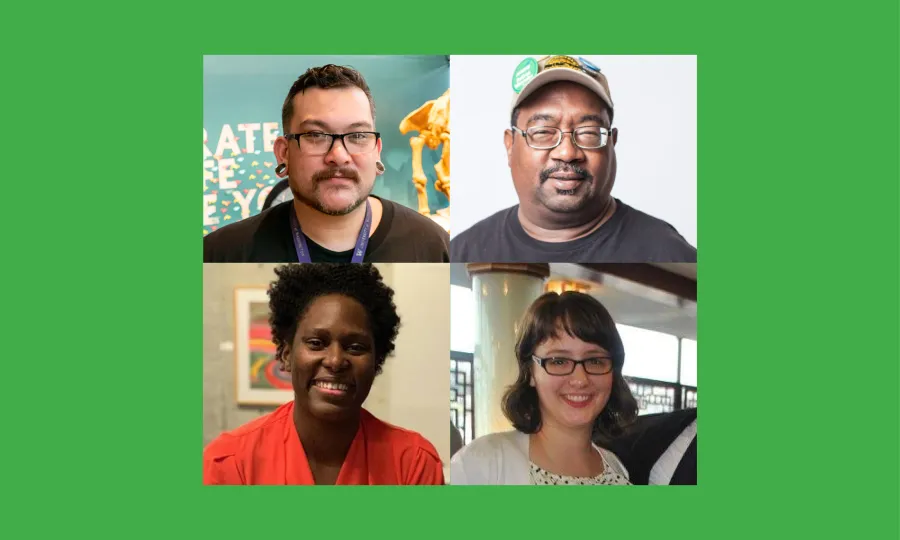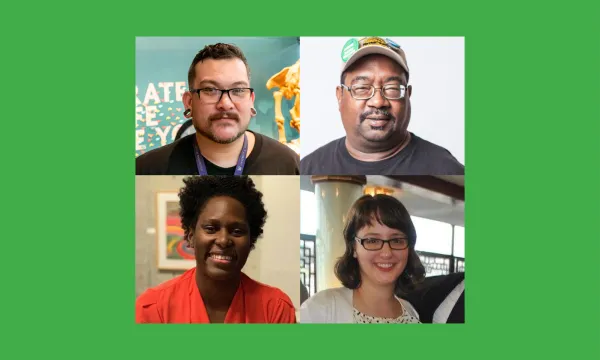WFSE Members Are Fighting for Black Lives


WASHINGTON STATE— WFSE members and labor activists across the globe have joined in support of racial justice and the Black Lives Matter movement following the murders of George Floyd, Breonna Taylor, Tony McDade, and other Black Americans.
Many are showing up in masks to protest together, volunteering with community aid efforts, giving money, or starting tough conversations with loved ones and neighbors. We spoke with four WFSE members working for racial justice.
───
Kevin Allen has been an adjudicator for the Disability Determination Services agency for 12 years.
A familiar face at community events for justice and a stalwart supporter of young leaders, Allen is a WFSE Local 843 member and serves on the WFSE Human Services Policy Committee. He’s also an active member of the Seattle King County NAACP, who Allen says have received an influx of memberships since June.
“A lot of people see this outrage, and they want to know, ‘What can I do?’” he said.
“But AFSCME also has a history of social justice history going back to the 1960s. Most people don’t look at that, so they might be joining other groups. They’ve never heard it talked about. They don’t know that you can do this within your union.”
“Rank and file members support this issue,” Allen said. “When you have racial equity and racial justice, then you get the kind of political engagement that can only support our union and union values.”
Allen offers a reframing of “lunch box issues,” a phrase often lobbed at union activists centering social justice.
“Social justice work and racial justice work is part of the work that our union does. It’s built within the mission and when we do that work, we’re making things better for ourselves and for others. We can do that and not feel like, ‘I’m stuck with just lunch pail issues.’ Because racial justice is also a lunch pail issue and a working condition issue.”
Whether showing up to support folks who live in unincorporated Skyway—which has the densest population of African Americans in the state—or assisting clients at work, Allen is committed to being a responsible community member and bringing up the next generation of leaders.
───
Riley Ingram-Sowell is also a WFSE Local 843 member. They have been a child welfare worker with DSHS in the Indian and Child Welfare agency for two and a half years.
“I love that the work I get to do within my union is another piece of advocacy,” they said. “That’s what it’s all about in the end—community helping community.”
As a social worker, it’s impossible to ignore racial disparities, Ingram-Sowell says, and they must be addressed continually and with humility and directness.
“Black and brown children are overrepresented in our system. We know that there’s an issue. Human services workers always want to do no harm or less harm to families. The only way to do that is to constantly fight for what’s right and make sure that our system isn’t negatively affecting people.”
“We only support people if we’re constantly reevaluating ways in which we get it wrong,” they said.
Ingram-Sowell sees union activism as critical to ensuring justice for every community member, from social workers to the families they serve.
“By making sure that we’re treated fairly, we make sure that the people we serve are treated fairly,” said Ingram-Sowell.
“Because of what our union has fought for, I have economic privilege versus my other friends who do social work but not within government, because you get paid more here than in community mental health,” they said.
“Whether it’s for a protest or a bail fund, or a nonprofit that does justice work, my friends and I are in the process of starting a giving circle. We don’t make a lot of money, but our impact goes further if we’re all working together.”
Ingram-Sowell also supports the Poor People’s Campaign, Decrim Seattle, and COVID-19 mutual aid groups.
───
Like Ingram-Sowell, Laurel Trammell feels a strong connection to the folks they serve. They work as a Rehabilitation Technician 1 Assistant at the Division of Vocational Rehabilitation (DVR), where they once accessed services.
“DVR helps offer people with disabilities autonomy and community,” said Trammell, also a member of the WFSE Executive Board and the Communications Committee.
“Unions exist to offer safety, security and community, and a sense of power,” they said. “It’s our responsibility to bring more people into that fold. We can’t just keep it to ourselves.”
Trammell has personally experienced police violence at several demonstrations. In 2017, they attended a protest against the Muslim ban at SeaTac airport.
“I said I wasn’t leaving till my siblings were released from custody— I viewed it as my responsibility [as a person with white privilege] to put my body on the line,” they said.
“I was in a group of protestors, and I had a police officer trying to choke me with his forearm. At first I thought it was a mistake. I moved out of the way, but he moved his arm back. I could not breathe. Finally I couldn’t breathe or move out of the way, so I moved his arm, which was seen as assault on a police officer. He grabbed my scarf and pulled me to the floor, and two other police, grown men, clambered on top of me.”
“There was pepper spray everywhere. I ended up going to the E.R. with whiplash and bruising,” Trammell said.
“You hear about police brutality. But then you see it, and you experience it, and it breaks something. You realize that you’re only as safe as they let you be,” said Trammell.
Trammell is still protesting for racial justice, as well as exploring other ways of contributing.
Exercising our constitutional right to civil disobedience is one critical piece of working towards a more just future for all Americans. We also have to have honest, difficult conversations with each other.
───
Bo McClung—who was recently awarded 2020 Gerald W. McEntee Scholarship—has been a hospital custodian at the Burke Museum and a Local 1488 member since 2016. As a shop steward, McClung supports fellow WFSE members at UW and UW Medical Center.
McClung has also helped organize labor solidarity contingents at protests against police brutality and pushed for the expulsion of the Seattle Police Guild from MLK Labor. Acting on the will of delegates from unions around the state, the expulsion occurred by majority vote after “yet another chance for the Seattle Police Officers’ Guild to make immediate and drastic changes to correct the systemic and institutional racism in the department.”
McClung regularly talks to coworkers and friends about community support as an alternative to today’s models of policing.
“A lot of people think, ‘We need cops, but we need them to act appropriately,’” siya* said. “That’s an admission that what’s going on is wrong.”
According to CNN, in 2018, U.S. police killed 1,000 people, vastly more than other similar nations— despite efforts across the nation to train police on implicit bias.
“When I’m talking about policing with coworkers or friends, I ask them to describe out loud what a healthy police system looks like. And you know what it almost always looks like? Community-driven safety,” McClung said. “The only way to have that safety is community involvement.”
McClung sees cuts to public services as directly linked to police violence.
“The issue is, I don’t have any other options if I see someone else having a mental breakdown, for example, besides calling 911. There isn’t another option, because they’ve been taken away by cutting services. By the time a person calls 911, it’s too late.”
People in crisis, McClung says, must be provided with support well before situations escalate, and nonviolent intervention and de-escalation when needed.
“We have an industry and infrastructure of crisis, instead of an industry and infrastructure of prevention.”
As public service workers, WFSE members commit do the work they do out of a deep sense of connection, responsibility, and care. Whether we’re protesting, donating, joining a constituency group, or demanding accountability in policing, this is a process of change and healing that has the potential to propel labor into a new era of unity and power.
*Siya is the Filipino pronoun. There are no words for “he” or “she”—it is the same pronoun.
